牛津版上海版八年级下册Unit2Water教案
上海牛津英语八年级water教学说明
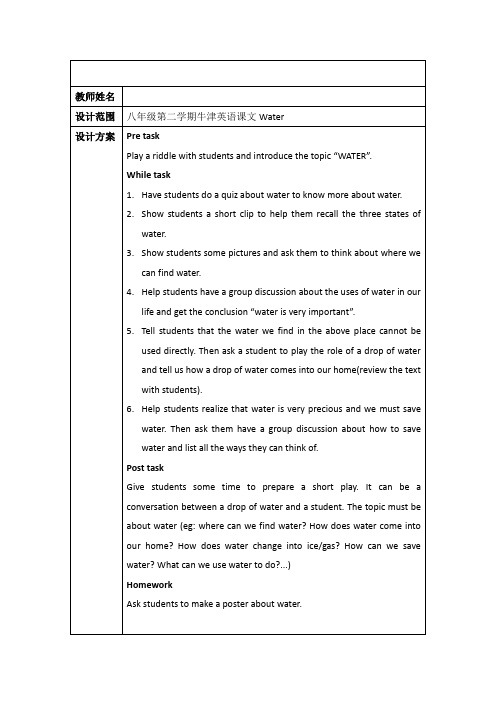
教师姓名
Байду номын сангаас设计范围
八年级第二学期牛津英语课文Water
设计方案
Pre task
Play a riddle with students and introduce the topic “WATER”.
While task
1.Have students do a quiz about water to know more about water.
2.Show students a short clip to help them recall the three states of water.
3.Show students some pictures and ask them to think about where we can find water.
4.Help students have a group discussion about the uses of water in our life and get the conclusion “water is very important”.
5.Tell students that the water we find in the above place cannot be used directly. Then ask a student to play the role of a drop of water and tell us how a drop of water comes into our home(review the text with students).
上海牛津沪教版八年级(下)同步讲义unit2
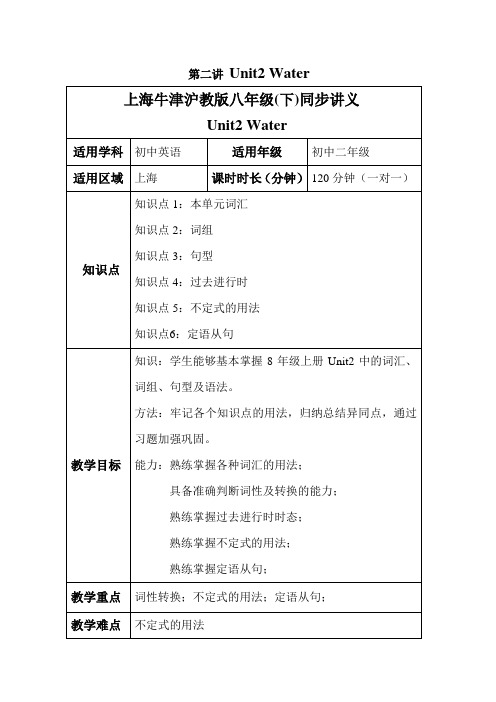
第二讲Unit2 Water教学过程一、课堂导入教师讲述一个与本节课题目有关的英文小故事,引出今日所要讲解的知识点,然后让学生简单梳理一下所涉及的问题,带着问题学习本节课的内容。
二、复习预习教师引导学生复习上节课学的重点内容,检测单词的用法,(以提问、回顾的形式进行),针对上节课的作业进行讲评、订正、答疑,并通过英文小故事导入本节课所要学习的新知识。
三、知识讲解1. 知识点一:重点单词1)daily [ˈdeɪli]【词性】adv.【词义】每天【经典例句】Your body needs about two litres of water daily.你的身体每天需要两升左右的水。
2)amount [əˈmaʊnt]【词性】n.【词义】数量;数额【易混淆点】an amount of 大量的,修饰不可数名词a number of 大量的,修饰可数名词【经典例句】When you exercise, the amount of water you need increase.当你锻炼的时候,你身体需要水的量就增加了。
3)increase [ɪnˈkri:s]【词性】v.【词义】增加【易混淆点】increase 增加decrease 减少【经典例句】When you exercise, the amount of water you need increase.当你锻炼的时候,你身体需要水的量就增加了。
4)remain [rɪˈmeɪn]【词性】v.【词义】仍然是;保持不变【易混淆点】remain 仍然是still 仍然;依旧【经典例句】The amount of water you need remains the same.你需要的水还是一样的。
5)symbol [ˈsɪmbl]【词性】n.【词义】符号【易混淆点】symbol 符号signal 标记【经典例句】The chemical symbol for water is H2O.水的化学分子式是H2O。
牛津英语八下unit2water课件

牛津英语八下unit2 water 课件一、教学内容1. 单词短语学习:liquid, solid, gas, cycle, evaporate, condense, precipitate, hydrate, transpire。
2. 对话学习:学习一段关于水循环的对话,了解水循环的过程及各个环节的英文表达。
3. 阅读理解:阅读一篇关于水循环的文章,进一步了解水循环的过程及其重要性。
二、教学目标1. 学生能够掌握水的不同形态的表达方式。
2. 学生能够描述水的循环过程以及各个环节的英文表达。
3. 学生能够在实际情景中运用所学知识进行交际。
三、教学难点与重点重点:掌握水的不同形态的表达方式,描述水的循环过程以及各个环节的英文表达。
难点:正确运用所学知识进行实际交际。
四、教具与学具准备1. 教具:PPT、黑板、粉笔。
2. 学具:课本、练习册、笔记本。
五、教学过程1. 情景引入:教师通过展示一些与水相关的图片,如河流、湖泊、雨滴等,引导学生谈论与水相关的话题。
2. 新课导入:教师引导学生学习本节课的主要内容,包括单词短语、对话和阅读理解。
3. 单词短语学习:教师展示PPT,引导学生跟读单词短语,并解释其含义。
4. 对话学习:教师播放对话录音,学生跟随录音朗读,然后教师提问,检查学生对对话内容的理解。
5. 阅读理解:教师分配阅读文章,学生阅读后,回答相关问题。
6. 课堂练习:教师设计一些练习题,让学生运用所学知识进行练习。
7. 小组活动:学生分组讨论,运用所学知识描述水的循环过程。
六、板书设计1. 水的不同形态的表达方式。
2. 水的循环过程及各个环节的英文表达。
七、作业设计1. 作业题目:用英语描述水的循环过程。
2. 作业题目:根据所学知识,编写一段关于水循环的对话。
答案:A: Do you know about the water cycle?B: Yes, I do. Water cycles from the earth's surface to the atmosphere and back again.A: That's right. It starts with evaporation, where water turns into water vapor.B: Then, the water vapor rises and cools, forming clouds.八、课后反思及拓展延伸课后,教师应反思本节课的教学效果,针对学生的掌握情况,调整教学策略。
上海牛津沪教版八年级(下)同步讲义unit2
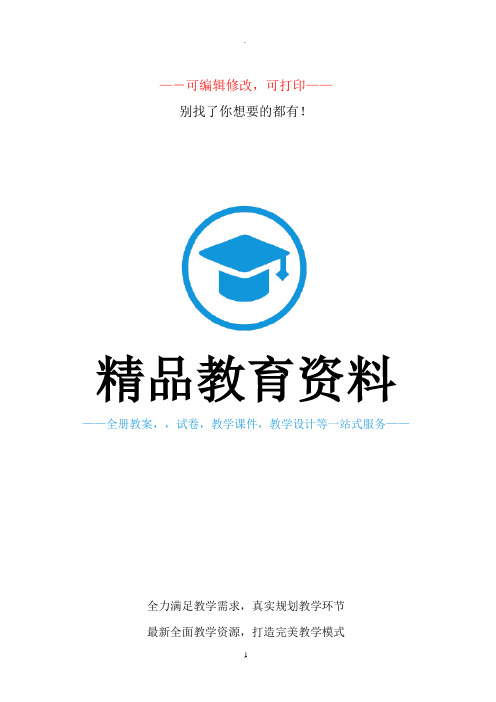
—-可编辑修改,可打印——别找了你想要的都有!精品教育资料——全册教案,,试卷,教学课件,教学设计等一站式服务——全力满足教学需求,真实规划教学环节最新全面教学资源,打造完美教学模式第二讲Unit2 Water上海牛津沪教版八年级(下)同步讲义Unit2 Water适用学科初中英语适用年级初中二年级适用区域上海课时时长(分钟)120分钟(一对一)知识点知识点1:本单元词汇知识点2:词组知识点3:句型知识点4:过去进行时知识点5:不定式的用法知识点6:定语从句教学目标知识:学生能够基本掌握8年级上册Unit2中的词汇、词组、句型及语法。
方法:牢记各个知识点的用法,归纳总结异同点,通过习题加强巩固。
能力:熟练掌握各种词汇的用法;具备准确判断词性及转换的能力;熟练掌握过去进行时时态;熟练掌握不定式的用法;熟练掌握定语从句;教学重点词性转换;不定式的用法;定语从句;教学难点不定式的用法教学过程一、课堂导入教师讲述一个与本节课题目有关的英文小故事,引出今日所要讲解的知识点,然后让学生简单梳理一下所涉及的问题,带着问题学习本节课的内容。
二、复习预习教师引导学生复习上节课学的重点内容,检测单词的用法,(以提问、回顾的形式进行),针对上节课的作业进行讲评、订正、答疑,并通过英文小故事导入本节课所要学习的新知识。
三、知识讲解1. 知识点一:重点单词1)daily [ˈdeɪli]【词性】adv.【词义】每天【经典例句】Your body needs about two litres of water daily.你的身体每天需要两升左右的水。
2)amount [əˈmaʊnt]【词性】n.【词义】数量;数额【易混淆点】an amount of 大量的,修饰不可数名词a number of 大量的,修饰可数名词【经典例句】When you exercise, the amount of water you need increase.当你锻炼的时候,你身体需要水的量就增加了。
Unit2Water微课程设计方案

Unit 2 Water微课程设计方案
设计亮点:
(请你从教学方法、案例选取、媒体选择、互动设计、技术细节等方面来说明你的设计亮点,以便其他教师更好地关注微课程的设计细节,不超过300字。
)
本节课采用多媒体教学法、任务型教学法、互动式教学法等。
所谓任务型英语教学(Task-based English Teaching),就是在英语课堂教学中让学生用英语完成各种真实的生活、学习、工作等任务,其运用英语的能力,教学中要以具体的任务为载体,以完成任务为动力,把知识和技能融为一体。
它是20世纪80年代在语言习得理论和交际教学思想的研究和实践基础上发展起来的有重要影响的语言教学理论。
Unit2Water

单元教学目标、课时划分、分课时教学目标Unit 2 Water Talk1st Period Reading: Water talk (I)Teaching focus:掌握本单元核心词汇Learning difficulties:了解until引导的时间状语从句的基本结构及意义Teaching Plan Unit 2 Water Talk2nd Period Reading: Water talk (II)Teaching focus:把握记叙文中描述的关键流程,并填入可视化图中。
Learning difficulties:将水的旅程中的关键流程在可视化图中补充完整。
Teaching Plan Unit 2 Water Talk3rd Period Grammar: Talking about amounts(I) (P20-21)Teaching focus:区分并正确使用可数名词和不可数名词数量的表达方式Learning difficulties:理解并正确使用可数名词和不可数名词数量的表达方式Unit 2 Water Talk4th Period Grammar: Talking about amounts(II) (P21-22)Teaching focus:Using adverbs of timeLearning difficulties:Using connectives to link similar ideasTeaching Plan Unit 2 Water Talk5th Period Listening: put the pictures below into the right order; P23Teaching focus:Learning difficulties:Teaching Plan Unit 2 Water Talk6th Period Speaking: Word linking (II) P24Teaching focus:Learning difficulties:Teaching Plan Unit 2 Water Talk7th Period Speaking: the use of water P25Teaching focus:Learning difficulties:Teaching Plan Unit 2 Water Talk8th Period *More Practice: More information about waterTeaching focus:引导学生生成文章main idea的过程Learning difficulties:正确理解groundwater的含义。
Unit 2教案 2022-2023学年牛津上海版英语八年级下册
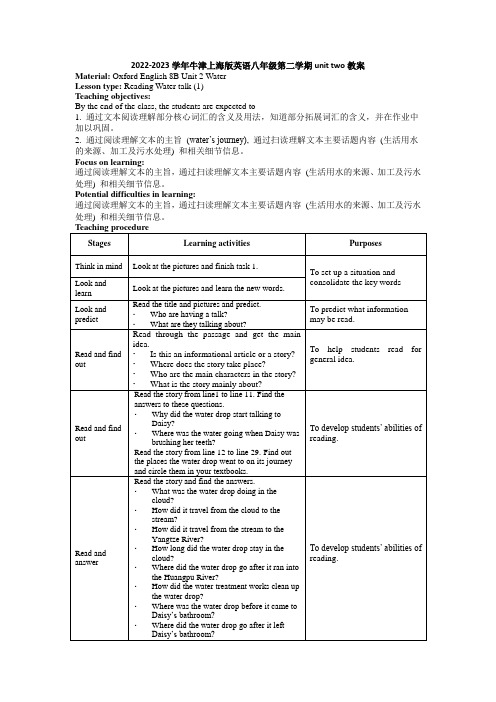
2022-2023学年牛津上海版英语八年级第二学期unit two教案Material: Oxford English 8B Unit 2 WaterLesson type: Reading Water talk (1)Teaching objectives:By the end of the class, the students are expected to1. 通过文本阅读理解部分核心词汇的含义及用法,知道部分拓展词汇的含义,并在作业中加以巩固。
2. 通过阅读理解文本的主旨(water’s journey),通过扫读理解文本主要话题内容(生活用水的来源、加工及污水处理) 和相关细节信息。
Focus on learning:通过阅读理解文本的主旨,通过扫读理解文本主要话题内容(生活用水的来源、加工及污水处理) 和相关细节信息。
Potential difficulties in learning:通过阅读理解文本的主旨,通过扫读理解文本主要话题内容(生活用水的来源、加工及污水处理) 和相关细节信息。
Teaching procedureStages Learning activities PurposesThink in mind Look at the pictures and finish task 1.To set up a situation andconsolidate the key words Look andlearnLook at the pictures and learn the new words.Look and predict Read the title and pictures and predict.∙Who are having a talk?∙What are they talking about?To predict what informationmay be read.Read and find out Read through the passage and get the mainidea.∙Is this an informational article or a story?∙Where does the story take place?∙Who are the main characters in the story?∙What is the story mainly about?To help students read forgeneral idea.Read and find out Read the story from line1 to line 11. Find theanswers to these questions.∙Why did the water drop start talking toDaisy?∙Where was the water going when Daisy wasbrushing her teeth?Read the story from line 12 to line 29. Find outthe places the water drop went to on its journeyand circle them in your textbooks.T o develop students’ abilities ofreading.Read and answer Read the story and find the answers.∙What was the water drop doing in thecloud?∙How did it travel from the cloud to thestream?∙How did it travel from the stream to theYangtze River?∙How long did the water drop stay in thecloud?∙Where did the water drop go after it ran intothe Huangpu River?∙How did the water treatment works clean upthe water drop?∙Where was the water drop before it came toDaisy’s bathroom?∙Where did the water drop go after it leftDaisy’s bathroom?To develop students’ abilities ofreading.∙What did the sewage plants do to the water drop?∙Was the sea the last place of its journey?Read and find out Complete Exercise D1 on page 19.To help students furtherunderstand the text.Read and write Find proper words in the story to complete the flow chart of a water drop’s journey. Use the simple past tense.AssignmentsCopy the new words and phrases you learnedin today's lesson. Then read them aloud after therecording.Correct the answers in Task 2 on yourWorksheet.Complete Exercises C (C1, C2 and C3) andD2 on pages 18 and 19 of your Student's Book.Read the story aloud after the recording.To consolidate what is learnt inclass.Material: Oxford English 8B Unit 2 WaterLesson type: Reading Water talk (2)Teaching objectives:By the end of the class, the students are expected to1. 运用恰当的词汇,描述水的旅程;2. 分析小说类文本写作手法在描述科学概念中的作用;3. 增强节约用水和合理用水的意识。
八年级英语下册 Unit 2 Water教案 (新版)牛津上海版

Unit 2 Water1教学目标Language learning objectivesTo learn the new words and phrasesTo be familiar with water’s journeySkill and ability objectiveTo develop listening and speaking skillsInstructional objectiveTo be aware of the preciousness of water2学情分析我任教的是本校一个普通班级,在过去的两年多时间里,充分利用好教材(牛津教材)所提供的丰富教学资源,我认真解析文本、创设语言学习环境、设计和实施教学活动,学生的英语听说读写的能力得到了有效的训练和提升。
3重点难点本课教学内容是牛津教材8B Chapter 6,是一篇关于水的科普性短文。
文章较长,且有一定难度,无法在30分钟时间内完成对整篇文章的教学,所以我选择文章中介绍水流程的一段。
原因是:1)这部分相对独立,意思完整;2)这部分是课文学习的教学重点;3)这部分包含了本课的重点词汇。
本课作为第一教时,我希望能突破教学的重点和难点,为后面的教学打好基础,消除障碍。
4教学过程学时重点Language learning objectivesTo learn the new words and phrasesTo be familiar with water’s journeySkill and ability objectiveTo develop listening and speaking skillsInstructional objectiveTo be aware of the preciousness of water学时难点作为科普性文章,单词有一定难度,需要进行图片,实物等引入帮助学生理解单词全文围绕水的旅程展开,对重要句型的运用有较高要求,需要进行铺垫教学活动活动1【导入】课文导入:Do you want to know more about water? Do you want to talk with water? Can wat er talk? In today’s le sson water can really talk. I am a drop of water today. You can call me Miss water. Look at the title “Water Talk”I will talk with you. It is a good chance for you to ask me some questions. Go ahead!How do you come here?Where can we see you?通过问题--“What does the sound make you think of?”,导入主题,活跃气氛,同时检测学生已有知识。
上海牛津沪教版八年级(下)同步讲义unit2

—-可编辑修改,可打印——别找了你想要的都有!精品教育资料——全册教案,,试卷,教学课件,教学设计等一站式服务——全力满足教学需求,真实规划教学环节最新全面教学资源,打造完美教学模式第二讲Unit2 Water上海牛津沪教版八年级(下)同步讲义Unit2 Water适用学科初中英语适用年级初中二年级适用区域上海课时时长(分钟)120分钟(一对一)知识点知识点1:本单元词汇知识点2:词组知识点3:句型知识点4:过去进行时知识点5:不定式的用法知识点6:定语从句教学目标知识:学生能够基本掌握8年级上册Unit2中的词汇、词组、句型及语法。
方法:牢记各个知识点的用法,归纳总结异同点,通过习题加强巩固。
能力:熟练掌握各种词汇的用法;具备准确判断词性及转换的能力;熟练掌握过去进行时时态;熟练掌握不定式的用法;熟练掌握定语从句;教学重点词性转换;不定式的用法;定语从句;教学难点不定式的用法教学过程一、课堂导入教师讲述一个与本节课题目有关的英文小故事,引出今日所要讲解的知识点,然后让学生简单梳理一下所涉及的问题,带着问题学习本节课的内容。
二、复习预习教师引导学生复习上节课学的重点内容,检测单词的用法,(以提问、回顾的形式进行),针对上节课的作业进行讲评、订正、答疑,并通过英文小故事导入本节课所要学习的新知识。
三、知识讲解1. 知识点一:重点单词1)daily [ˈdeɪli]【词性】adv.【词义】每天【经典例句】Your body needs about two litres of water daily.你的身体每天需要两升左右的水。
2)amount [əˈmaʊnt]【词性】n.【词义】数量;数额【易混淆点】an amount of 大量的,修饰不可数名词a number of 大量的,修饰可数名词【经典例句】When you exercise, the amount of water you need increase.当你锻炼的时候,你身体需要水的量就增加了。
初中英语 牛津上海版八年级下Unit2基础知识点复习教案
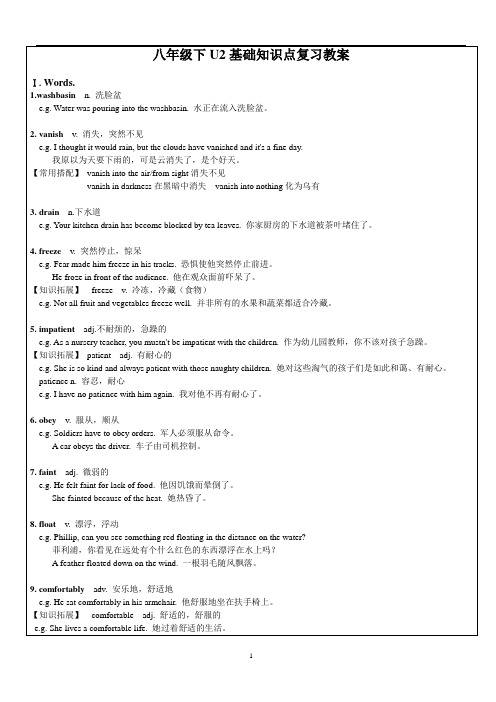
e. g. I am going to play table tennis with my friends this afternoon.(2) be going to还表示客观情况下(非主观打算)即将要发生的动作。
e. g. The weatherman says it is going to rain tomorrow.【随堂练习】ⅠRead and choose the best answer.()1. _______ Tai Mountain is the most famous mountain in Shandong.A. TheB. AnC. AD. /()2. There are ________ trees in my neighbourhood. We should plant some more.A. a lot ofB. fewC. a littleD. little()3. It's time ________ a rest. You have read the story book for a long time.A. to haveB. havingC. hasD. had()4. Don't ________ harmful chemicals into the river or lake.A. bringB. takeC. rushD. pour()5. The lights are still on in the lab. Please remember before leaving.A. turning them offB. to turn them offC. turning off themD. to turn off themⅡ. Rewrite the sentences as required.1.The man cut down a magnolia tree. (改为否定句)The man down a magnolia tree.2.He enjoyed the view on the thirtieth floor of Jinmao Building. (就划线部分提问)he _________ on the thirtieth floor of Jinmao Building?Ⅲ. Reading comprehension.AOnce upon a time some tiny frogs held a competition. The first to reach the top of a very high tower would be the winner.A big crowd gathered around the tower to see the race and cheer them on.The race began. No one in the crowd really believed that any of the tiny frogs would reach the top of tower. "They will never get to the top," someone said.One by one, the tiny frogs began to fall off.The crowd kept yelling," It's too difficult! No frog will make it!"More tiny frogs got tired and gave up, but one continued climbing, higher and higher. This one wouldn't give up.In the end, he was the only one left. It got to the top. The other frogs naturally wanted to know: How did the frog make it?One frog stepped forward to ask the winner. Then the frog found that the winner was deaf.He had won because he was able to keep his own mind. He couldn't hear criticism(批评) ; neither could he hear praise(表扬). There is a lesson for us all in the little frog's story. Don't let others block you on your way to your goal.True or false.() 1. No one came to see the race.() 2. No one believed any of the frogs would win.() 3. The crowd kept yelling because one frog reached the top of the tower.() 4. All the frogs stopped climbing because it was too difficult.() 5. The winner could hear nothing.。
牛津版上海版八年级下册 Unit 2 Water 教案
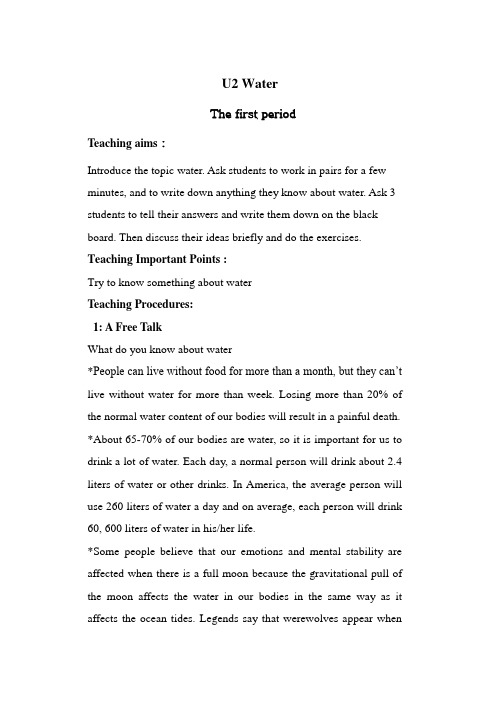
U2 WaterThe first periodTeaching aims:Introduce the topic water. Ask students to work in pairs for a few minutes, and to write down anything they know about water. Ask 3 students to tell their answers and write them down on the black board. Then discuss their ideas briefly and do the exercises. Teaching Important Points :Try to know something about waterTeaching Procedures:1: A Free TalkWhat do you know about water*People can live without food for more than a month, but they can’t live without water for more than week. Losing more than 20% of the normal water content of our bodies will result in a painful death. *About 65-70% of our bodies are water, so it is important for us to drink a lot of water. Each day, a normal person will drink about 2.4 liters of water or other drinks. In America, the average person will use 260 liters of water a day and on average, each person will drink 60, 600 liters of water in his/her life.*Some people believe that our emotions and mental stability are affected when there is a full moon because the gravitational pull of the moon affects the water in our bodies in the same way as it affects the ocean tides. Legends say that werewolves appear whenthere is a full moon.*You need more water during and after exercise because you lose water by sweating and you need to replace the water that is lost.*Water freezes at 0℃ (32℉). When it freezes, it changes into ice. Water boils at 100℃(212℉) when it changes its form into a gas, becoming steam.2: Look and think* Choose the write answer1 You could live without water for a few ______.a daysb weeksc hours2 Your body needs about ______ liters of water daily.a twob fourc eight3 When you exercise, the amount of water you need _____.a increasesb decreasesc remains the same4 When you freeze water, it becomes a _______.a liquidb solidc gas5 About _______ of the earth is covered by water.a one thirdb one halfc two thirds6 The scientific symbol for water is ________.a H2Ob HO2c H2O2* Use the picture to put these sentences in the correct order.( ) It flows to the sea.( ) It runs into streams and rivers.( ) It rises from the sea to the sky.( ) Water falls from the clouds as rain.( ) It falls as rain again.Homework:Preview the text: Water talkThe second periodTeaching aims:1 Try to understand the whole lesson and read it fluently. The tone andpronunciation should be basically right.2 Learn the new words and phrases.Teaching aids:Multimedia equipmentTeaching Important Points :How to understand the test completely .Teaching Difficult Points :Teaching Procedures:1: A Free talk(Ask two Ss to talk about some measures we use to save water and say the following.) T: Very good . Thank you for your performance. We have learnt that water is very important and we don’t have enough water in the world. If we don’t have water in our dail y life, the situation will be terrible and we all will die. Some people in other places are suffering from lack of water, such as African people. We should treat every drop of water seriously and should no waster even a drop of water.Show the text on the screen then give brief introduction to the students and then let Ss read the new text after the recording .2: learn some new words.1 brush n. 刷子,毛刷v. 刷,擦,拂拭We brush our teeth with a toothbrush everyday.2 pour v. 灌注,倾泻,涌入,流,倾盆大雨pour oil on the fire 火上加油Tears poured from her eyes.People poured into he hall.Please pour me a cup of tea.At 5 o’ clock workers pour ed out of the factories.It was pouring.3 sink n. 水槽I left the soap by the side of the sink.v. 使…下沉The ship is sinking.4 vanish v. 消失Forests are vanishing from our land.5 drain n. 排水管Your kitchen drain has become blocked by tea leaves.v. 排去The water drained away slowly.6 freeze v. (使)结冰,凝固The terrible news froze my blood.freezing adj. 极冷的frozen adj. 冻结的frozenfood7 impatient adj. 不耐烦的,没耐心的opp. patient 有耐心的I’m getting impatient because I’ve waited for an hour.patience n. 耐心,容忍I have no patience with him again.8 obey v. 服从,顺从,听话They refused to obey (the order).9 faint adj. 微弱的Did you hear the faint moan just now?10 float adj. 漂浮,飘浮Wood floats on water.11 comfortably adv. 舒适的,舒服的comfortable adj. 安乐的,舒适的comfort n. 慰藉,安乐I feel very comfortable in this chair.The lovely baby was a comfort to her.12 view n. 景色,风景The house has a view over the sea.n. 看法,观点What is your view on school punishments?13 speed v. 加速speed upn. 速度at a speed of 80 miles an hour14 nod v. 点头She nodded to show that she agreed with me.n. 点头He greeted me with a nod.15 relax v. 松弛,放松,休息After a day of hard work, I relaxed at home.16 puzzled adj. 困惑的,疑惑的puzzle v. (使)迷惑,(使)为难,迷惑不解n. 难题,迷a crossword puzzleI was puzzled how to do it.Their strange relationship puzzles me.17 treatment n. 治疗,处理His treatment of the animal was cruel.hard treatment: 虐待be under treatment:在治疗中treat v. 对待,处理18 thorough adj. 完全的,彻底的We’d better have a thorough cleaning to welcome the Chinese New Year.thoroughly adv. 完全地,彻底地We have cleaned the house thoroughly to welcome the Chinese New Year.19 chemical n. 化学制品They added a few chemicals to clean up the water.chemical adj. 化学的chemicalchangechemistry n. 化学She is out chemistry teacher.20 sewage n. 污水We can’t let out sewage because it will pollute the water.21 plant n. 工厂,仪器When the plant closed down, many workers lost their jobs.n. 植物v. 种植22 pump v. 抽水Can you help to pump the water from the well?The heart pumps blood.n. 抽水机,打气筒23 precious adj. 珍贵的,宝贵的Nothing is more precious than friendship.The beautiful vase is very precious.24 weird adj. 怪异的,奇怪的,不可思议的Tom had some weird ideas.3: PracticePlay the tape for students to listen and repeat, then answer some questions.4: Read and thinkComplete the following blanks.1 PETER Why was the voice impatient?JUDY ___________ Daisy was ______________ ______________.2 PETER Why did Daisy nod her head?JUDY ____________ she knew ____ _____ _____ _____ was.3 PETER Why did the water go to a treatment works?JUDY ____________ it _____ _____ _____ _____ journey.4 PETER Why did the water say, ‘I’ll be back in the sea again.’?JUDY ____________ it _____ _____ the sea _____ _____ _____ place.5 PETER Why did the water say it was like liquid gold?JUDY ___________ it believed that _____ _____ _____.6 PETER Why did Benny think his sister was weird?JUDY _________ she said, ‘_____ _____ _____ __________ _____.’4: Explain the language Points :1 look around: 向四周看I looked around and found there was no one in the street at all.2 It is /was time to do sth. 是该…的时候了,到…时候了It is time to have lunch. 该吃饭了。
牛津上海版八年级下册 Unit 2 Water 说课稿
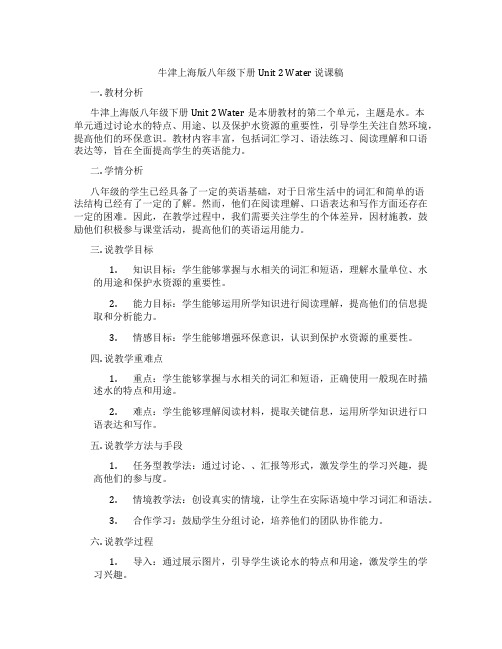
牛津上海版八年级下册 Unit 2 Water 说课稿一. 教材分析牛津上海版八年级下册Unit 2 Water是本册教材的第二个单元,主题是水。
本单元通过讨论水的特点、用途、以及保护水资源的重要性,引导学生关注自然环境,提高他们的环保意识。
教材内容丰富,包括词汇学习、语法练习、阅读理解和口语表达等,旨在全面提高学生的英语能力。
二. 学情分析八年级的学生已经具备了一定的英语基础,对于日常生活中的词汇和简单的语法结构已经有了一定的了解。
然而,他们在阅读理解、口语表达和写作方面还存在一定的困难。
因此,在教学过程中,我们需要关注学生的个体差异,因材施教,鼓励他们积极参与课堂活动,提高他们的英语运用能力。
三. 说教学目标1.知识目标:学生能够掌握与水相关的词汇和短语,理解水量单位、水的用途和保护水资源的重要性。
2.能力目标:学生能够运用所学知识进行阅读理解,提高他们的信息提取和分析能力。
3.情感目标:学生能够增强环保意识,认识到保护水资源的重要性。
四. 说教学重难点1.重点:学生能够掌握与水相关的词汇和短语,正确使用一般现在时描述水的特点和用途。
2.难点:学生能够理解阅读材料,提取关键信息,运用所学知识进行口语表达和写作。
五. 说教学方法与手段1.任务型教学法:通过讨论、、汇报等形式,激发学生的学习兴趣,提高他们的参与度。
2.情境教学法:创设真实的情境,让学生在实际语境中学习词汇和语法。
3.合作学习:鼓励学生分组讨论,培养他们的团队协作能力。
六. 说教学过程1.导入:通过展示图片,引导学生谈论水的特点和用途,激发学生的学习兴趣。
2.新课呈现:介绍一般现在时,让学生通过观察图片和阅读材料,掌握一般现在时的用法。
3.课堂活动:学生进行小组讨论,讨论水的用途和保护水资源的重要性,培养他们的口语表达能力。
4.阅读理解:学生阅读文章,提取关键信息,回答问题,提高他们的阅读理解能力。
5.语法练习:学生完成练习题,巩固一般现在时的用法。
牛津上海版八年级下册 Unit 2 Water 教学设计

牛津上海版八年级下册 Unit 2 Water 教学设计一. 教材分析牛津上海版八年级下册Unit 2 Water是关于水资源的一单元。
本单元主要围绕水资源的利用、保护和节约展开,通过学习让学生了解水资源的重要性,提高他们的环保意识。
教材包括阅读理解、词汇、语法、听力和口语练习等多个方面,内容丰富,贴近生活,有利于激发学生的学习兴趣。
二. 学情分析八年级的学生已具备一定的英语基础,对于日常生活中的话题有较强的兴趣。
但部分学生可能在阅读理解、词汇和语法方面存在困难。
因此,在教学过程中,需要关注学生的个体差异,因材施教,提高他们的英语综合运用能力。
三. 教学目标1.知识目标:学生能掌握与水相关的词汇和表达方式,了解水资源的重要性,提高环保意识。
2.能力目标:学生能通过阅读、听力练习提高自己的语言运用能力,学会在实际生活中运用所学知识。
3.情感目标:学生能认识到水资源的重要性,自觉节约用水,保护环境。
四. 教学重难点1.重点:学生能熟练掌握与水相关的词汇和表达方式,提高阅读理解和听力能力。
2.难点:学生能运用所学知识,进行实际生活中的环保行动。
五. 教学方法1.情境教学法:通过设置生活情境,让学生在实际语境中学习单词和表达方式。
2.任务型教学法:学生分组完成任务,激发合作精神,提高口语表达能力。
3.启发式教学法:引导学生思考水资源的重要性,培养他们的环保意识。
六. 教学准备1.准备相关的水资源图片、视频等教学素材。
2.设计好各个教学环节的活动和任务。
3.准备听力材料和阅读文章。
七. 教学过程1.导入(5分钟)利用图片、视频等素材引导学生谈论水资源,激发学生的学习兴趣。
2.呈现(10分钟)介绍本节课的主要内容,展示阅读文章和听力材料。
让学生初步了解水资源的重要性。
3.操练(15分钟)学生阅读文章,回答相关问题。
针对文章中的词汇和表达方式进行讲解和练习。
4.巩固(10分钟)学生进行听力练习,回答相关问题。
牛津译上海英语八年级第二学期:Unit 2 Water 学案(无答案)1

Unit 2 Water【学习目标】知识:学生能够基本掌握词汇、词组、句型及语法。
方法:牢记各个知识点的用法,归纳总结异同点,通过习题加强巩固。
能力:1.熟练掌握各种词汇的用法。
2.具备准确判断词性及转换的能力。
3.熟练掌握过去进行时时态。
4.熟练掌握不定式的用法。
5.熟练掌握定语从句。
【学习重难点】1.词性转换。
2.不定式的用法。
3.定语从句。
【学习过程】一、翻译下列词组。
砍伐:_____________把废物倒入小溪中:____________不见了:________________破坏环境:_________________二、选择正确的词,并用正确形式填空。
go swim dirty play pour1.I saw some children __________in the river when i passed just now.2.There are many students_________ football on the playground.3.Look! The man is _____ lots of litter into the river.4.The water in the river is to____ for fish to live.三、选择填空。
( )1.I often saw them _____on the playground last year.A.play soccer.B.playing soccer.C.to play soccer.( )2.I have been ill for a month ____ the bad weather.A.because.B.because of.C.so that.( )3.Look, there is a cat ____a tree over there.A.climbing.B.climbed.C.climb.( )4.I have _____questions to ask you.A.too much.B.too many.C much too.( )5.We should ____our classroom every day and keep it _____.A.to clean, clean.B.clean, cleaning.C.clean, clean四、翻译句子1.他们昨天计划去野餐。
【牛津上海版】2019年春学期八年级英语下册U2Water英文教学案
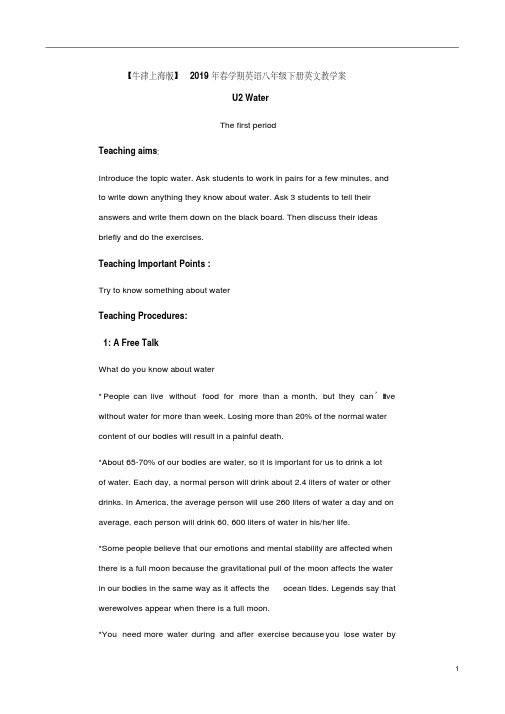
【牛津上海版】2019年春学期英语八年级下册英文教学案U2 WaterThe first periodTeaching aims:Introduce the topic water. Ask students to work in pairs for a few minutes, and to write down anything they know about water. Ask 3 students to tell their answers and write them down on the black board. Then discuss their ideas briefly and do the exercises.Teaching Important Points :Try to know something about waterTeaching Procedures:1: A Free TalkWhat do you know about water*People can live without food for more than a month, but they can’t live without water for more than week. Losing more than 20% of the normal water content of our bodies will result in a painful death.*About 65-70% of our bodies are water, so it is important for us to drink a lotof water. Each day, a normal person will drink about 2.4 liters of water or other drinks. In America, the average person will use 260 liters of water a day and on average, each person will drink 60, 600 liters of water in his/her life.*Some people believe that our emotions and mental stability are affected when there is a full moon because the gravitational pull of the moon affects the water in our bodies in the same way as it affects the ocean tides. Legends say that werewolves appear when there is a full moon.*You need more water during and after exercise because you lose water bysweating and you need to replace the water that is lost.*Water freezes at 0℃ (32℉). When it freezes, it changes into ice. Water boils at 100℃(212℉) when it changes its form into a gas, becoming steam.2: Look and think* Choose the write answer1 You could live without water for a few ______.a daysb weeksc hours2 Your body needs about ______ liters of water daily.a twob fourc eight3 When you exercise, the amount of water you need _____.a increasesb decreasesc remains the same4 When you freeze water, it becomes a _______.a liquidb solidc gas5 About _______ of the earth is covered by water.a one thirdb one halfc two thirds6 The scientific symbol for water is ________.a H2Ob HO2c H2O2* Use the picture to put these sentences in the correct order.( ) It flows to the sea.( ) It runs into streams and rivers.( ) It rises from the sea to the sky.( ) Water falls from the clouds as rain.( ) It falls as rain again.Homework:Preview the text: Water talkThe second periodTeaching aims:1 Try to understand the whole lesson and read it fluently. The tone andpronunciation should be basically right.2 Learn the new words and phrases.Teaching aids:Multimedia equipmentTeaching Important Points :How to understand the test completely .Teaching Difficult Points :Teaching Procedures:1: A Free talk(Ask two Ss to talk about some measures we use to save water and say thefollowing.) T: Very good . Thank you for your performance.We have learnt that water is very important and we don’t have enough water in thebe terrible and weworld. If we don’t have water in our daily life, the situation willall will die. Some people in other places are suffering from lack of water, such asAfrican people. We should treat every drop of water seriously and should no wastereven a drop of water.Show the text on the screen then give brief introduction to the students and then letSs read the new text after the recording .2: learn some new words.1 brush n. 刷子,毛刷v. 刷,擦,拂拭We brush our teeth with a toothbrush everyday.2 pour v. 灌注,倾泻,涌入,流,倾盆大雨pour oil on the fire 火上加油Tears poured from her eyes.People poured into he hall.Please pour me a cup of tea.At 5 o’ clock workers poured out of the factories.It was pouring.3 sink n. 水槽I left the soap by the side of the sink.v. 使…下沉The ship is sinking.4 vanish v. 消失Forests are vanishing from our land.5 drain n. 排水管Your kitchen drain has become blocked by tea leaves.v. 排去The water drained away slowly.6 freeze v. (使)结冰,凝固The terrible news froze my blood.freezing adj. 极冷的frozen adj. 冻结的frozen food7 impatient adj. 不耐烦的,没耐心的opp. patient 有耐心的I’m getting impatient because I’ve waited for an hour.patience n. 耐心,容忍I have no patience with him again.8 obey v. 服从,顺从,听话They refused to obey (the order).9 faint adj. 微弱的Did you hear the faint moan just now?10 float adj. 漂浮,飘浮Wood floats on water.11 comfortably adv. 舒适的,舒服的comfortable adj. 安乐的,舒适的comfort n. 慰藉,安乐I feel very comfortable in this chair.The lovely baby was a comfort to her.12 view n. 景色,风景The house has a view over the sea.n. 看法,观点What is your view on school punishments?13 speed v. 加速speed upn. 速度at a speed of 80 miles an hour14 nod v. 点头She nodded to show that she agreed with me.n. 点头He greeted me with a nod.15 relax v. 松弛,放松,休息After a day of hard work, I relaxed at home.16 puzzled adj. 困惑的,疑惑的puzzle v. (使)迷惑,(使)为难,迷惑不解n. 难题,迷a crossword puzzleI was puzzled how to do it.Their strange relationship puzzles me.17 treatment n. 治疗,处理His treatment of the animal was cruel.hard treatment: 虐待be under treatment:在治疗中treat v. 对待,处理18 thorough adj. 完全的,彻底的We’d bette r have a thorough cleaning to welcome the Chinese New Year.thoroughly adv. 完全地,彻底地We have cleaned the house thoroughly to welcome the Chinese New Year.19 chemical n. 化学制品They added a few chemicals to clean up the water.chemical adj. 化学的chemical change chemistry n. 化学She is out chemistry teacher.20 sewage n. 污水We can’t let out sewage because it will pollute the water.21 plant n. 工厂,仪器When the plant closed down, many workers lost their jobs.n. 植物v. 种植22 pump v. 抽水Can you help to pump the water from the well?The heart pumps blood.n. 抽水机,打气筒23 precious adj. 珍贵的,宝贵的Nothing is more precious than friendship.The beautiful vase is very precious.24 weird adj. 怪异的,奇怪的,不可思议的Tom had some weird ideas.3: PracticePlay the tape for students to listen and repeat, then answer some questions. 4: Read and thinkComplete the following blanks.1 PETER Why was the voice impatient?JUDY ___________ Daisy was ______________ ______________.2 PETER Why did Daisy nod her head?JUDY ____________ she knew ____ _____ _____ _____ was.3 PETER Why did the water go to a treatment works?JUDY ____________ it _____ _____ _____ _____ journey.4 PETER Why did the water say, ‘I’ll be back in the sea again.’?JUDY ____________ it _____ _____ the sea _____ _____ _____ place.5 PETER Why did the water say it was like liquid gold?JUDY ___________ it believed that _____ _____ _____.6 PETER Why did Benny think his sister was weird?JUDY _________ she said, ‘_____ _____ _____ _____ _____ _____.’4: Explain the language Points :1 look around: 向四周看I looked around and found there was no one in the street at all.2 It is /was time to do sth. 是该…的时候了,到…时候了It is time to have lunch. 该吃饭了。
牛津英语八下unit2water课件

牛津英语八下unit2 water 课件一、教学内容本课教材选用的是牛津英语八年级下册第二单元“Water”。
本节课主要探讨水的各种用途,涵盖饮用、农业、工业和个人卫生等方面。
通过学习,学生将掌握与水相关的词汇和短语,如“drink”、“wash”和“irrigate”等。
同时,学生将学会描述水的不同用途,并能表达自己对水的重要性的看法。
二、教学目标1. 学生能掌握与水相关的词汇和短语,并运用这些词汇描述水的不同用途。
2. 学生能听懂、说出一系列关于水用途的句子,并用英语进行简单交流。
3. 学生能理解水对人类生活的重要性,提升节约用水的意识。
三、教学难点与重点重点:学生能掌握与水相关的词汇和短语,并运用这些词汇描述水的不同用途。
难点:学生能听懂、说出一系列关于水用途的句子,并用英语进行简单交流。
四、教具与学具准备教具:多媒体课件、黑板、粉笔学具:课本、练习本、文具五、教学过程1. 情境引入:通过展示一张干旱地区的图片,引导学生思考水的重要性,引入本课主题。
2. 词汇学习:带领学生学习与水相关的词汇和短语,如“drink”、“wash”和“irrigate”等,并让学生进行随堂练习。
3. 课文讲解:讲解课文内容,引导学生学习水的不同用途,如饮用、农业、工业和个人卫生等,并让学生进行随堂练习。
4. 对话练习:组织学生进行对话练习,让学生运用所学知识描述水的不同用途。
5. 听力练习:播放听力材料,学生听后回答问题,检查学生对课文内容的理解。
7. 作业布置:布置作业,让学生课后巩固所学知识。
六、板书设计板书内容:水的用途1. 饮用2. 农业3. 工业4. 个人卫生七、作业设计1. 作业题目:用英语描述水的不同用途。
答案示例:Water is essential for various purposes. It's not just for drinking, but also for agriculture, industry, and personal hygiene.2. 作业题目:列举三种节约用水的方法。
2022年牛津版八下 U2 Water教案 牛津上海版

Unit 2 Water教学目标Language objectives:Make the students understand the main idea of the passage.Teach the students how water goes into our flats.Ability objectives:Students learn to retell the water’s journey according to some key words. Students can learn some reading skills.Emotional objectives:Let the students know it is not easy for water to get to our flats and make them realize the value of water. Ask the students to save water.2重点难点1.to master the reading method2.to know about the circulation of water and try to express it3教学过程教学活动活动1【导入】warming-up1) Do a quiz about waterstudents have a competition.Purposes:To arouse the students’ interest in class activities and to know much more about water.2) Review how to use waterstudents talk about how to use water.Purposes:to enable the students to practice their oral ability.And let them know water is useful.It is also provide clues for the next discussion.3) Review how rain formsstudents read the sentences and put them in right order.Purposes:Let them know where rain comes from and think about how rain comes to our house.Lead to our passage.活动2【讲授】While-taskPart I:1) Ask the students to open their booksstudents number the paragraphs.2) Divide the whole passage into three parts.Part I: Para 1-3Part II: Para 4-12Part III: Para13-17Ask the students to read the first part.students read the first part.3) Show a picture that shows tap, sink and drain together.students to speak them out according to the picture.Purposes:Be familiar with tap, sink and drain.4) Guess and choose the meaning of froze, impatient, faint and vanishing. students guess and choose.Purposes:To let the students have a further master of the new words.Part II:1) Ask the students to read Part II. Before reading give them two questions:Q1. Is it easy for the water to get to Daisy’s bathroomQ2. How many places has the water been to during his journeyStudents read Part II.After reading answer the questions2) Show a map of the water’s journey.students complete the map.3) Look at the pictures and tell the journey again and ask some questions about it. Students answer some questions about the long journey.4) Ask the students to read and complete a short passage about the journey. Students fill in the blanks.Purposes:Let the students pay attention to water’s journey for the first time.Let the students pay attention to the names of the “stations〞 of the water’s journey.Be familiar with the “stations〞 of the long journey.To be familiar with the long journey.Part III:Reading1) Ask the students to read Part III and answer two Qs:Q1. Why did the water say it was like liquid goldQ2. Why did Benny think his sister was weirdStudents read the third Part and answer Qs.2) Let students to choose the right answers of the new words.Students guess and choosePurposes:To know the meaning of the new words.Speaking and writingDivide the students into 5 groups and let them have a discussion and write down something about water.Students write something about water and choose some students to make a report. Ask students to know some features of water and water is precious we should save water. So next lesson I will ask students to talk about how to save water.活动3【作业】作业1. Finish Ex1-3.2. Read and then retell the long journey.3. Think about how to save water第二课时Integrated skillsI. Teaching aims and learning objectivesBy the end of the lesson, students should be able to:1. get a general understanding about a volunteer project;plete the notes with the information obtained from listening material;3. talk about ways to help people in need in our daily lives.II. Teaching contentsNew words and phrases: south-west, north-west, project, a training plan, keep in touch,talk on the phone, improve their livesIII. Focus of the lesson and predicted area of difficulty1. Learn about a volunteer project.2. Talk about ways to help people in need in our daily lives.IV.Teaching proceduresA Working in a mountain areaStep 1Lead-in1. Play a videoT: This girl is Judy. She is Peter’s cousin. She likes travelling. Last year, she went on a trip to Guizhou and visited a local primary school. Do you know where Guizhouis It’s in the south-west of China. And what about Xinjiang It is in the north-west of China.She took some photos about the students there. Let’s see some pictures. 2. Have a talkT: After seeing the video, we know that children in mountain areas live a hard life. Let’s work together to take care of those children and their dreams. 【设计意图:展示Judy去旅行时拍摄的有关山区小学的照片, 从衣食住行等方面阐述山区学校学生的学习和生活状况,让学生从细微处体会山区孩子生活的艰难。
- 1、下载文档前请自行甄别文档内容的完整性,平台不提供额外的编辑、内容补充、找答案等附加服务。
- 2、"仅部分预览"的文档,不可在线预览部分如存在完整性等问题,可反馈申请退款(可完整预览的文档不适用该条件!)。
- 3、如文档侵犯您的权益,请联系客服反馈,我们会尽快为您处理(人工客服工作时间:9:00-18:30)。
U2 WaterThe first periodTeaching aims:Introduce the topic water. Ask students to work in pairs for a few minutes, and to write down anything they know about water. Ask 3 students to tell their answers and write them down on the black board. Then discuss their ideas briefly and do the exercises. Teaching Important Points :Try to know something about waterTeaching Procedures:1: A Free TalkWhat do you know about water* People can live without food for more than a month, but they can ' t live without water for more than week. Losing more than 20% of the normal water content of our bodies will result in a painful death.*About 65-70% of our bodies are water, so it is important for us to drink a lot of water. Each day, a normal person will drink about 2.4 liters of water or other drinks. In America, the average person will use 260 liters of water a day and on average, each person will drink 60, 600 liters of water in his/her life.*Some people believe that our emotions and mental stability are affected when there is a full moon because the gravitational pull of the moon affects the water in our bodies in the same way as it affects the ocean tides. Legends say that werewolves appear when there is a full moon.*You need more water during and after exercise because you lose water by sweating and you need to replace the water that is lost.*Water freezes at 0°C (32 T ). When it freezes, it changes into ice. Water boils at 100C (212 T ) when it changes its form into a gas, becoming steam.2: Look and think* Choose the write answer1 You could live without water for a few ____ .a daysb weeksc hours2 Your body needs about ____ liters of water daily.a twob fourc eight3 When you exercise, the amount of water you need ____ .a increasesb decreasesc remains the same4 When you freeze water, it becomes a ______ .a liquidb solidc gas5 About ______ of the earth is covered by water.a one thirdb one halfc two thirds6 The scientific symbol for water is _______ .a H2Ob HO2c H2O2* Use the picture to put these sentences in the correct order.( ) It flows to the sea.( ) It runs into streams and rivers.( ) It rises from the sea to the sky.( ) Water falls from the clouds as rain.( ) It falls as rain again.Homework:Preview the text: Water talkThe second periodTeaching aims:1 Try to understand the whole lesson and read it fluently. The tone and pronunciationshould be basically right.2 Learn the new words and phrases.Teaching aids:Multimedia equipmentTeaching Important Points :How to understand the test completely .Teaching Difficult Points : Teaching Procedures:1: A Free talk(Ask two Ss to talk about some measures we use to save water and say the following.) T: Very good . Thank you for your performance.We have learnt that water is very important and we don ' t have enough water in the world. If we don ' t have wateryinlifeo,utrhdeasilituationwill be terrible and we all will die. Some people in other places are suffering from lack of water, such as African people. We should treat every drop of water seriously and should no waster even a drop of water.Show the text on the screen then give brief introduction to the students and then let Ss read the new text after the recording .2: learn some new words.1 brush n. 刷子,毛刷v. 刷,擦,拂拭We brush our teeth with a toothbrush everyday.2 pour v. 灌注,倾泻,涌入,流,倾盆大雨pour oil on the fire 火上加油Tears poured from her eyes.People poured into he hall.Please pour me a cup of tea.At 5 o ' clock workers peodurout of the factories.It was pouring.3 sink n. 水槽I left the soap by the side of the sink.v.使…下沉The ship is sinking.4 vanish v. 消失Forests are vanishing from our land.5 drain n. 排水管Your kitchen drain has become blocked by tea leaves.v. 排去The water drained away slowly.6 freeze v. (使)结冰,凝固The terrible news froze my blood.freezing adj. 极冷的frozen adj. 冻结的frozen food7 impatient adj. 不耐烦的,没耐心的opp. patient 有耐心的I ' m getting impatient because I ' ve waited for an hour.patience n. 耐心,容忍I have no patience with him again.8 obey v. 服从,顺从,听话They refused to obey (the order).9 faint adj. 微弱的Did you hear the faint moan just now?10 float adj. 漂浮,飘浮Wood floats on water.11 comfortably adv. 舒适的,舒服的comfortable adj. 安乐的,舒适的comfort n. 慰藉,安乐I feel very comfortable in this chair. The lovely baby was a comfort to her.12 view n. 景色,风景The house has a view over the sea.n. 看法,观点What is your view on school punishments?13 speed v. 加速speed upn. 速度at a speed of 80 miles an hour She nodded to show that she agreed with me.n. 点头He greeted me with a nod.15 relax v. 松弛,放松,休息After a day of hard work, I relaxed at home.16 puzzled adj. 困惑的,疑惑的puzzle v. (使)迷惑,(使)为难,迷惑不解n. 难题,迷a crossword puzzleI was puzzled how to do it.Their strange relationship puzzles me.14 nod v. 点头17 treatment n. 治疗,处理His treatment of the animal was cruel.hard treatment: 虐待be under treatmen:t 在治疗中treat v. 对待,处理18 thorough adj. 完全的,彻底的We' d better have a thorough cleaning to welcome the Chinese New Year.thoroughly adv. 完全地,彻底地We have cleaned the house thoroughly to welcome the Chinese New Year.19 chemical n. 化学制品They added a few chemicals to clean up the water.chemical adj. 化学的chemicalchangechemistry n. 化学She is out chemistry teacher.20 sewage n. 污水We can' t let out sewage because it will pollute the water.21 plant n. 工厂,仪器When the plant closed down, many workers lost their jobs.n. 植物v. 种植22 pump v. 抽水Can you help to pump the water from the well?The heart pumps blood.n. 抽水机,打气筒23 precious adj. 珍贵的,宝贵的Nothing is more precious than friendship.The beautiful vase is very precious.24 weird adj. 怪异的,奇怪的,不可思议的Tom had some weird ideas.3: PracticePlay the tape for students to listen and repeat, then answer some questions. 4: Read and thinkComplete the following blanks.1 PETER Why was the voice impatient?Daisy wasJUDY2 PETER Why did Daisy nod her head?JUDY _______________ she knew ___ ____ ____ _____ was.3 PETER Why did the water go to a treatment works?JUDY _______________ it ____ ____ ____ ____ journey.4 PETER Why did the water say, ‘ I ' ll be back in the sea again. '?JUDY _______________ it ______ ____ the sea _____ ________ place.5 PETER Why did the water say it was like liquid gold?JUDY ____________ it believed that ____ ____ ____ .6 PETER Why did Benny think his sister was weird?JUDY __________ she said, ‘ __________ ____ ____ ____4: Explain the language Points :1 look around: 向四周看I looked around and found there was no one in the street at all.2 It is /was time to do sth. 是该…的时候了,到…时候了It is time to have lunch. 该吃饭了。
